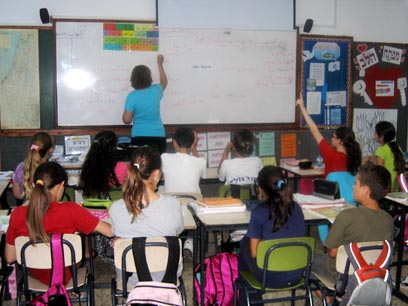_a.jpg)
Children are the key to coexistence
Arab teachers working at Jewish elementary schools to promote cultural understanding have to deal with anger and frustration on a daily basis, and more so at times of war between Israel and its neighbors
On a sunny day near the end of the school year, Nina Hashem seems to have no difficulty engaging her fifth-graders the Rakefet Elementary School in Carmiel.
Nina is an Arab citizen of Israel and her students are Jewish citizens. She has fully integrated into the Jewish Israeli education system and twice a week Nina teaches fifth and sixth graders Arabic.
The faces of her students show no discomfort or anger in learning the language of their neighbors in the region. To them, learning Arabic seems as regular as learning multiplication. In fact, the specially designed curriculum called “Ya Salam” that conveys messages of peace through innovative and researched approaches makes learning more fun than Mathematics.
Yet there are real challenges faced by teachers like Nina. Classrooms such as hers are not immune to anger and frustration derived from rising trends of separatism between Arabs and Jews in Israel.
Empowering Arab women
Beginning in 2004, The Abraham Fund Initiatives, in cooperation with local municipalities and the Ministry of Education and generous financial support from the Jewish Agency for Israel, established the infrastructure for the teaching of Arabic and Arab culture in Jewish elementary schools.
At the classroom (Photo: Yacoob Ibrahim)
Language as a Cultural Bridge, as the program is called, works to knock down barriers of discrimination and separatism in the Israeli Jewish education system. In addition to the language course twice a week, the children also have encounters with Arab professionals who provide theater performances, musical lessons, songs and other activities which allow children the opportunity to use their newfound language skills in fun and entertaining ways.
“Although we also look for male teachers, the schools hire mostly female teachers, which serves as a tool for empowering Arab women, thus strengthening Arab society as a whole,” said Mohammad Darawshe, co-executive director of The Abraham Fund Initiatives, a Jerusalem-based NGO that promotes equality and social inclusion for all of Israel’s citizens. “Arab female teachers are now placed in a position of authority and serve as role models for Jewish youth.”
Difficulties during wartime
But in a time of political tension and anxiety, these women are faced with two major obstacles. The first is dealing with the children and their displaced anger (born of this very complex political situation) which Arab teachers sometimes receive, while retaining an air of professionalism in the face of discrimination.
The second is overcoming their own internal struggle with societal problems, namely the most recent war, and how Jewish Israelis react to their people’s suffering. In other words, seeing on a daily basis what might be considered hopelessness, they must overcome their differences and influence others. “These women are on the front lines in the battle for coexistence,” Darawshe said.
Although Nina spoke about what a pleasure it is to teach these young people her culture and language, some teachers including Nina faced tremendous difficulties with students during and after the Gaza, and Lebanon wars.
In a couple of instances Jewish children refused to learn Arabic. In 2006, one of Nina’s students refused to learn after his older brother was killed in Lebanon. Nina first spoke privately with the student saying, “I know this is difficult. This is difficult for all of us. But I need you to try and learn with us…you must try.” She continued, “After speaking with him and his parents on numerous occasions with positive, encouraging dialogue, he began to turn. He separates his feelings of grief from his learning Arabic through his relationship with me, his teacher, and he is now one of my better students.”
Hope is not lost
The robust agenda of the program and its continued success, coupled with training seminars and experienced mentors for each teacher, show the resilience of such a project and the enduring idea behind it.The program is currently in place in 100 schools throughout the country, mostly in regions and cities with mixed populations such as the Galilee, Haifa, and Tel Aviv-Jaffa. An additional indicator of the program’s success is the fact that there is also an overwhelming interest in teaching positions. The Abraham Fund received two hundred CV’s from applicants last year alone.
Most importantly however, the children are still excited about learning Arabic, and the program continues to have the support of families as well as school faculty.
“Our goal is to see this program adopted as national coexistence education policy by the Ministry of Education, and we are as eager for this as the children are for their next Arabic class,” organization spokesperson Josh Simon said. The Education Ministry also looks at the program as an illustration of successful strides within the Israeli Jewish education system and therefore has increased its support dramatically since the program began five years ago.
The faculty of the Rakefet Elementary School has certainly seen a positive impact of the program on their children. Initiative Director Dadi Komem said, “Children are not afraid of Arabs anymore. If you want to change attitudes, you have to start with the children and their education.”










